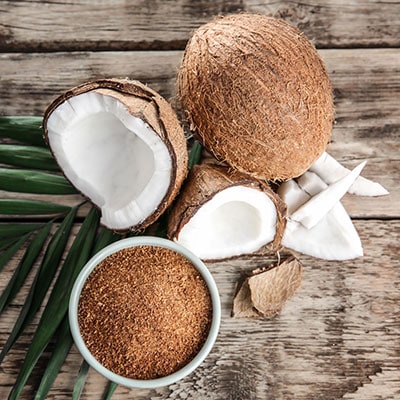Fun fact: A coconut tree can reach a height of up to 98 feet tall & in a single season it can yield 20-100 mature fruits.
 Background
Background
- Coconut is a member of the Arecaceae botanical family otherwise known as the palm tree family.
- The coconut flesh can be processed into coconut milk or coconut oil. The liquid inside the coconut is known as coconut water.
- The dried husk yields a fiber called coir, which is used to make ropes, mats, baskets, brushes, and brooms, and can be spun into yarn for fishnets as the fiber is resistant to salt water.
Nutrition
- Coconut is an excellent source of fiber and manganese and a good source of copper.
- Fiber support digestive health by normalizing bowel movements.
- Manganese assists in wound healing and carbohydrate, protein, and cholesterol metabolism.
- Copper is an antioxidant that supports bone, collagen, and connective tissue formation.
How to purchase, prepare and store
- Fresh coconuts are typically available year-round, but they are in season from October to December.
- When choosing a fresh coconut, it should feel heavy and full with no cracks or mold growing on the three eyes on the outside of the coconut. The coconut water should swish around when shaken.
- Brown coconuts contain more of the white meat and less coconut water, while green coconuts contain more coconut water.
- Use a skewer or corkscrew to create a hole in the coconut to drain the coconut water. Then, wrap the coconut in a towel and break open with a hammer and rinse.
- Carefully use a knife with a round tip to remove the coconut flesh from the outer shell.
- Store the whole coconut at room temperature for a week or in the refrigerator for 2-3 weeks.
- Fresh coconut meat can be stored in the refrigerator for one week in an airtight container.
- Coconut can also be found processed as coconut oil, coconut milk and yogurt, coconut flakes, and coconut flour that can be used in baking.
Nutrition Facts
Coconut meat, raw, 1 piece (2”x 2.5” or 45 grams)
- Calories: 159
- Protein: 1.5 g
- Fat: 15.1 g
- Carbohydrate: 6.84 g
- Fiber: 4.05 g
- Calcium: 6.3 mg
- Iron: 1.09 mg
- Magnesium: 14.4 mg
- Phosphorus: 50.8 mg
- Folate: 11.7 µg
- Vitamin A: 0.0 µg
Via fdc.nal.usda.gov
Recipes
Request an Appointment